-
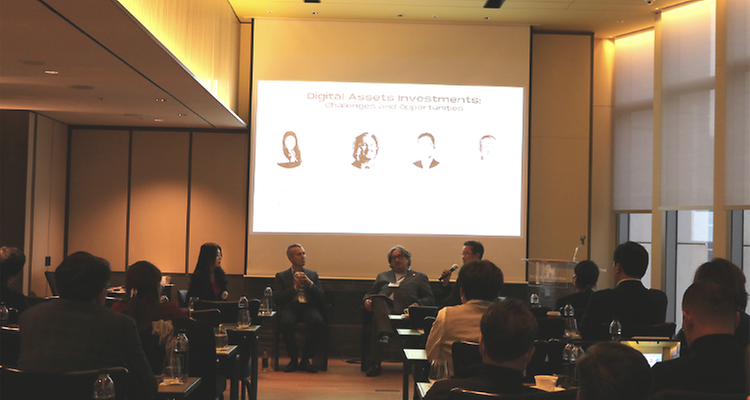
- On "Digital Assets Investments: Challenges and Opportunities", moderated by Prof. Youngju Nielsen
- Last month, Prof. Youngju Nielsen moderated a session on “Digital Assets Investments: Challenges and Opportunities”. The session was at an exclusive investment event hosted by VNX, a financial service organization supported by Luxembourg’s Ministry of the Economy. The event mainly concerned investment opportunities during turbulent times, especially in traditional and crypto markets. Prof. Nielsen led discussions mainly about opportunities in the crypto market, with three panels including the CEO of VNX, Mr. Alexander Tkachenko. As the market is still in its early stage, she expressed skepticism initially, but continually elicited experts’ trend analyses, regulations, future suggestions, and so on. At the end of the event, there was a ceremony awarding a commemorative NFT from the VNX Gold Genesis Collection created for VNX by South Korean visual artist Dr. Jeonghyun Ha. Dr. Ha is known for expressing childlike innocence in her work. To learn more about the event, visit the official VNX website: https://vnx.li/vnx-hosts-an-exclusive-event-for-korean-investors-in-seoul-on-the-side-of-the-luxembourg-economic-mission-to-south-korea/
-
- 작성일 2022-12-30
- 조회수 67496
-
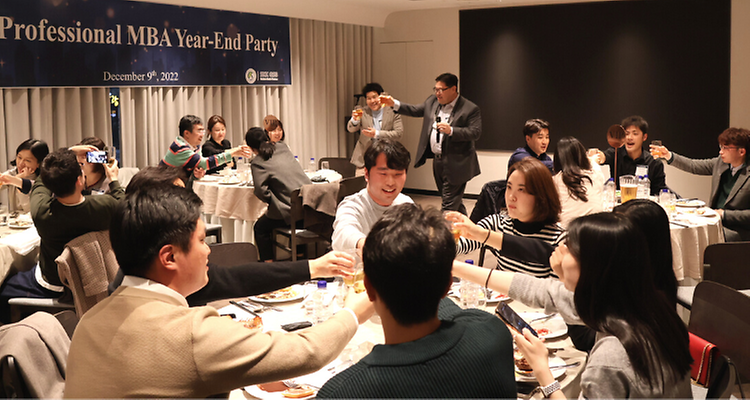
- Adieu 2022! In PMBA gatherings, the more, the merrier
- In gatherings, the more, the merrier! Among SKK GSB's programs, the Professional MBA (PMBA) has the most students. Four PMBA cohorts—the 11th to the 14th—gathered near Gangnam in mid-December to enjoy the essence of 'the more, the better,' celebrating the year-end, and welcoming the new year. The students cherished the moments they had shared, putting aside for a moment their packed life of juggling academic, work, and family life; and the PMBA student council even organized a magic show for everyone to enjoy. All PMBA students have done a good job this year, and we look forward to making more memories with you in 2023. Happy New Year!
-
- 작성일 2022-12-29
- 조회수 51763
-
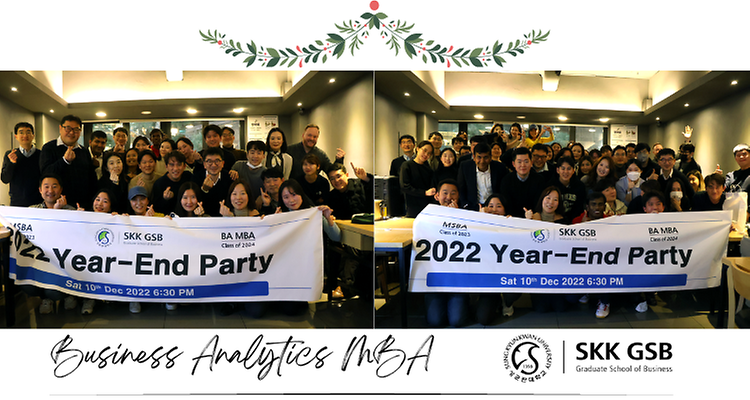
- Adieu 2022! Business Analytics MBA's happy party
- To wrap up the season and another year dedicated to their studies, Business Analytics MBA students held a year-end party near Gwanghwamun in mid-December. Hosted by Mr. Changwoo Lim (Class of 2024), the party started with short speeches from Dean Shih and Vice Dean Pungaliya, which were followed by learning activities. Then, the students played a speed game using their understanding of current affairs and their mental agility. Next, they calculated who had won the Lucky Draw, applying some skills they had practiced during the semester. Ms. Narah Koh and Ms. Dahgyo Lee then expressed their sentiments in a short chat, and the session was wrapped up with group photos. As the sun sets on another year, may it rise again and shine a light on new opportunities, perspectives, and adventures ahead.
-
- 작성일 2022-12-28
- 조회수 44162
-
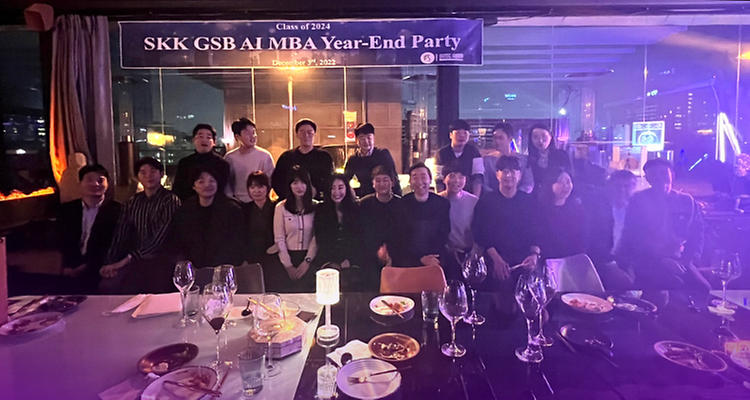
- Adieu 2022! AI MBA celebrated the outgoing year
- Cheers to all! SKK GSB AI MBA students organized a year-end party early this month near Gwanghwamun. Reminiscing on all their fun and learning this year, everyone found the party a happy occasion to be grateful for the time they have spent together. With the co-chairs, Prof. Raunaq Pungaliya and Prof. Youngju Nielsen, the students shared memorable moments with good food and drinks. Some were even lucky enough to win a prize. Wishing you peace, love, and joy this holiday season and throughout 2023. (From left, Prof. Raunaq Pungaliya and Prof. Youngju Nielsen)
-
- 작성일 2022-12-26
- 조회수 44841
-
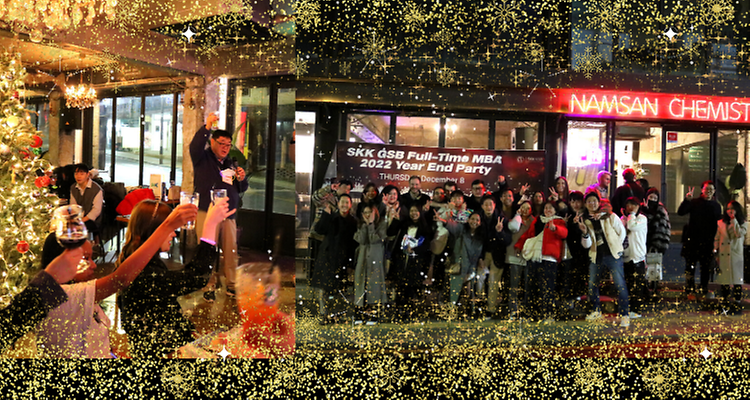
- Adieu 2022! FMBA students enjoyed their own friendly 'chemistry'
- What a year we had in 2022! SKK GSB Full-Time MBA students gathered near Namsan to reflect on their fruitful year. At the venue Namsan Chemistry, over delicious food and drinks, the students enjoyed their own friendly chemistry, clinking glasses to toast their successes during this semester. As the good times rolled, it was hard not to get into the spirit. We hope you all enjoy the winter vacation safe and sound!
-
- 작성일 2022-12-23
- 조회수 10240
-
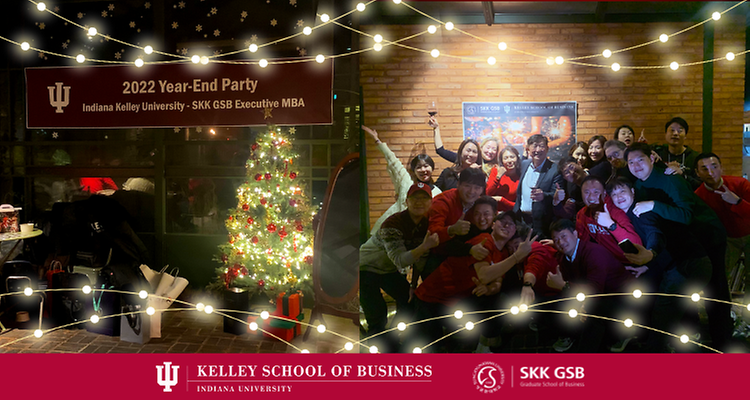
- Adieu 2022! EMBA Cohort 14 had an year-end party together
- Adieu 2022! SKK GSB's Executive MBA 14th cohort embarked on their MBA journey this fall, and held their year-end party in Gangnam last Saturday, giving thanks for what they had achieved in 2022. The students had dinner, and made some happy memories, including celebrating Seongmo Kang’s birthday, all while singing cheerfully. They also awarded Prof. Andrew Yi the Kind and Gentle Prize in thanks for his nurturing nature throughout the year. All best wishes for upcoming adventures. Stay sound and healthy, and let’s meet with a refreshed mind next year!
-
- 작성일 2022-12-21
- 조회수 10477
-
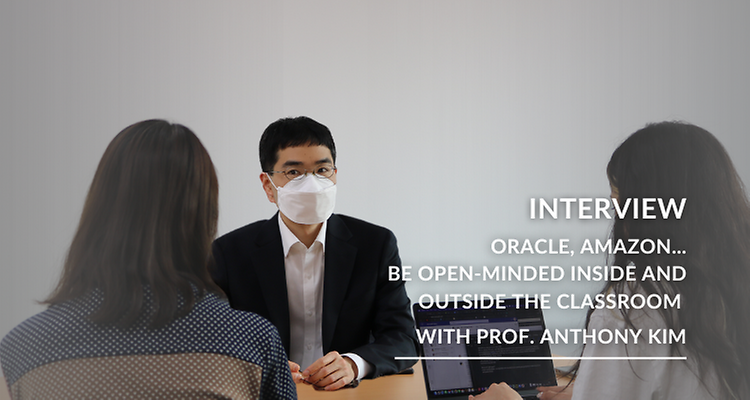
- [Professor Interview] Professor Anthony Kim: Oracle, Amazon... Be open-minded inside and outside the classroom
- Professor Anthony Kim, who joined SKK GSB this fall as a Decision Sciences professor, discusses his background, life before his academic career, and school experiences. - Please introduce yourself briefly. My name is Anthony Kim. I teach Quantitative Analysis for Business Decisions and Statistics for Analytics at SKK GSB. My research interests are online advertising, revenue management, game theory and online decision making. Before coming to SKK GSB, I worked in the U.S. tech industry for some time. I was an applied scientist at Amazon in the New York office. Before Amazon, I was a postdoctoral researcher in the Decision, Risk, and Operations Division of Columbia Business School, following my Ph.D. at Stanford University. I also have worked as a software engineer at Oracle before pursuing my Ph.D. - What made you decide to go into teaching? I decided to go into teaching because I want to teach MBA students and help them grow to become future business leaders in global organizations. In SKK GSB’s world-class MBA programs, I have wonderful opportunities to interact with and teach students from different countries. The fact that I can support these MBA students in their growth process motivates me. - How do you enjoy teaching at SKK GSB so far? I enjoy teaching at SKK GSB. I teach Quantitative Analysis for Business Decisions and Statistics for Analytics, covering fundamental concepts people use when working with large data sets to understand and make business decisions. I have learned and used these concepts in various settings over the years. These are essential concepts, and it is an excellent opportunity for me to teach the concepts and skills to students. - Please briefly talk about your research focus and recent paper publication. As a graduate student and a postdoctoral researcher, I worked on research problems in online advertising, revenue management, game theory and online decision making. I'm interested in these areas. More specifically, I have worked on ad campaign budget management strategies, which are different ways to help advertisers efficiently manage their daily ad campaign budgets. There are several different ways and I have studied their various characteristics such as revenue and incentive properties. I have also researched advertisement contracts, informationally robust mechanisms, and vehicle routing problems related to ride and delivery services. - Do you have any advice for students in your class? My advice for students in my class would be to be open-minded inside and outside the classroom. Of course, that's easier said than done, but there are many great ideas out there, and it takes time to digest them, appreciate them, and see their value. It is important to stay open-minded and recognize learning opportunities at unexpected times. You should also actively seek opportunities to learn. That can involve taking risks, but it's important to test the boundary of your comfort zone. Samantha Marchner and Supisara Kitpipit, SKK GSB PR Committee, Class of 2024
-
- 작성일 2022-12-16
- 조회수 12131
-
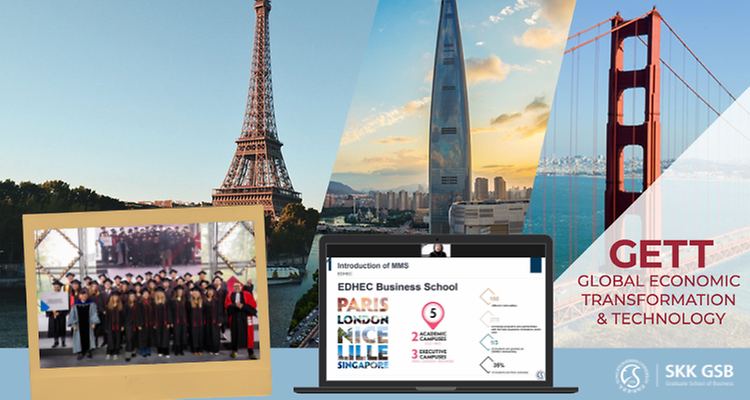
- Introduction of MMS (Master in Management Studies) Program
- The Master in Management Studies (MMS) program is a two-year academic program exposing students to the managerial skills sought by companies to meet sustainable development needs and the challenges of disruptive change brought about by advances in information and technology. The program is run jointly by EDHEC Business School and SKK GSB, and is officially called the Master in Management, Global Economic Transformation & Technology (GETT). Students experience local cultures while studying at prestigious institutions in Paris, Seoul, and Berkeley to cultivate global thinking and innovative problem-solving skills. Recently, SKK GSB and EDHEC admission officers held an online info session for those who are new to this fascinating program. To improve participants' understanding, the session consisted of a thorough introduction to the program, the application process, and scholarship benefits, followed by a Q&A session. Many potential applicants took advantage of this rare opportunity to ask questions directly to admission officers, and these were answered immediately. Questions included: · Do we need to understand French to take this program? (No, the whole program is taught in English.) and · After how many years' work experience can we skipping the internship year? (One full year.) MMS program application opens every year, so if anyone missed the last one, please keep up with our event schedule. SKK GSB and EDHEC also support one another at on-site events. In October, there were celebrations in Paris and Lille, France. Prof. Andrew Yi, Vice Dean at SKK GSB, attended these to celebrate the program's graduates, and to welcome new students. In the ceremony, he looked forward to receiving these students in Korea. Prof. Michelle Sisto, Associate Dean at EDHEC, also advised the students to explore professional paths, and to use their talents wisely and responsibly. Reflecting on her experiences, Ms. Helene Guo, a recent graduate, made the following comment: "We have studied in three different countries, and we have experienced unforgettable moments. We all came as strangers, and now we leave as friends." For further inquiries on MMS, our admission team is ready to assist you. You can contact us at fmba.skkgsb@skku.edu or +82-2-740-1530. You can also explore our website: https://gsb.skku.edu/en/Management_Studies/Overview.do
-
- 작성일 2022-12-09
- 조회수 13589
-
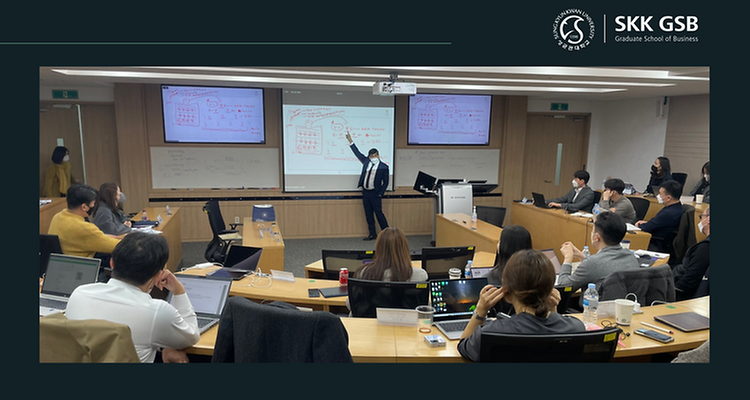
- Professional MBA held an open class on Investment Management, given by Prof. Pungaliya
- The Professional MBA held an open class with Prof. Raunaq Pungaliya early last month. The lecture was taken from the course Investment Management. This course aims to help students understand how debt and equity instruments are evaluated by capital market participants and investors, and to teach the role of financial markets in setting asset prices. In the open class, Prof. Pungaliya dove deep into analyzing the 2008 Credit Crisis, from its cause and development to its resulting impact. Next, he led an examination of bond valuation, developing discussion of two determinants of a bond’s value: interest rate risk, and credit risk. Students also learned how to evaluate bonds. SKK GSB thanks Prof. Raunaq for leading this interesting session. SKK GSB hosts open classes for potential MBA students considering starting their academic journey. Join us for upcoming open classes, and find out how to discover your global future! Visit our website to learn more and to register for forthcoming events.
-
- 작성일 2022-12-07
- 조회수 11774
-
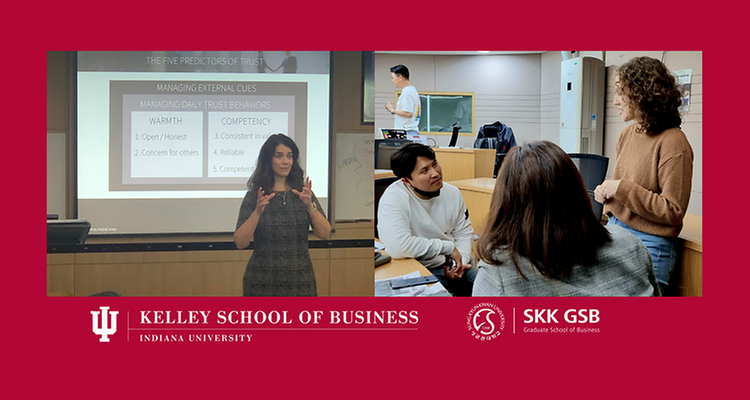
- Executive MBA held an open class on Effective Communication, given by Prof. Brenda Bailey-Hughes
- On Saturday, October 15th, Prof. Brenda Bailey-Hughes from IU Kelley School of Business held an open class on the importance of effective communication for the Executive MBA students. The main aim was to increase participants' credibility in professional conversation, so students practiced their conversation skills in groups of three using effective facial expressions, appropriate eye contact, and helpful body language. Attendees reported that they found the class very useful, and they were impressed by Prof. Bailey-Hughes's teaching methods. We were honored to have IU Kelley's Prof. Bailey-Hughes teach our students the necessary skills to exchange information clearly. Join us in our upcoming open classes, and expand your global future! Visit our website to learn more and to register for forthcoming events. Prof. Brenda Bailey-Hughes is an award-winning faculty member of the Kelley School of Business at Indiana University, where she teaches communication and leadership courses. She specializes in communication training, and has coached many executives from Fortune 500 companies.
-
- 작성일 2022-12-05
- 조회수 11432










